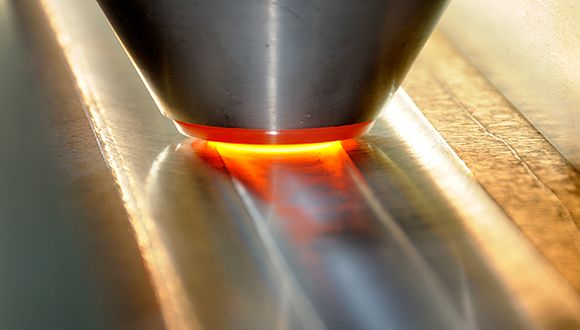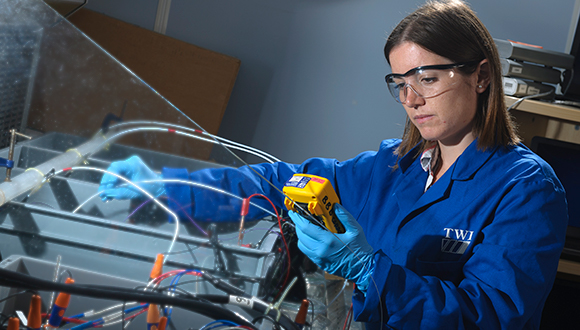Sun, 10 May, 2020
PhD Scholarships with NSIRC and sponsored by the Lloyd's Register Foundation
The Lloyd's Register Foundation (LRF) is a founding partner of National Structural Integrity Research Centre (NSIRC) since 2012, and continues to provide important funding for NSIRC PhD Scholarships that will have an impact across industry and academia.
As an independent global charity, LRF has a mission to support research, innovation, and education that will make the world a safer place.
With guidance from LRF, NSIRC continuous to work alongside it's partner universities, as well as the industrial members of the TWI, in order to create the latest PhD research topics.
Thanks to the unique opportunities available to NSIRC doctoral students, these hot topics are based on calls from Industry for research. This provides researchers with the opportunities to contribute to a new area of academic research with real industrial impact.
Here are two of the latest PhD research topics with LRF...
- Digital manufacturing - In-process quality monitoring of friction stir welding
- Recycling of thermoset resins via the development of a solvent trigger de-curing system
 Friction stir weld in steel. Photo: TWI Ltd
Friction stir weld in steel. Photo: TWI Ltd
Background to the topics and why Industry is calling for this research...
In-process quality monitoring of friction stir welding
Awarded by Lancaster University - A strong and dynamic university in the northwest of England, it is highly regarded internationally for it's Engineering Department.
Friction Stir Welding (FSW) is a solid state joining technique invented by TWI in Cambridge. It is used in across many industries around the world. Modern day applications for this technology include in the manufacture of trains, space vehicles, aeroplanes and cars.
TWI has been the global leader for research into welding processes since the 1950s. Today, research conducted onsite in Cambridge covers hundreds of technologies. These include innovation into digital manufacturing, composite materials, artificial intelligence, batteries, thermosetting plastics and many more.
As new applications of FSW continue to appear, what Industry needs is real-time quality monitoring in order to begin automation. Current literature on the subject has extremely limited contributions regarding in-process monitoring and adaptive control.
For Industry to have an in-process real time quality monitoring system, would dramatically improve process acceptability, data exchange and integration with other systems. It would also go a long way to reducing the need for post-weld non-destructive testing (NDT) and destructive testing.
......
Recycling of thermoset resins via the development of a solvent trigger de-curing system
Awarded by London South Bank University (LSBU) - A university that is continuing to rise in The Guardian University League Tables, ranking 19th in 2020 for Chemical Engineering courses
Over half of composites use thermosetting resins and there is currently no commercial recycling process for thermoset composites.
This is because the polymers in thermoset composites are largely cross-linked and therefore cannot be remoulded. This is unlike thermoplastics which can be re-melted.
All across the world, composite recycling for thermoset and thermoplastic, is still not a closed-loop in terms of resource efficiency. Today, recycled material still cannot be re-used in the same applications as the pure material.
Here is the PhD research that Industry urgently needs...
In 2020, there is a growing interest from Industry for PhD students conducting research into the use of solvolysis/chemical dissolution for fibre reinforced polymer composite recycling. This is down to it's potential to recover both resin and fibre components.
Chemical dissolution in selective solvents dissolves soluble thermoplastic and leaves insoluble, undamaged fibre for recovery and re-use. Dissolution and reconstitution of thermosets is impossible without covalent change at the molecular level.
A combined reaction chemistry-solvent system will be needed to decouple the covalent bonds within the thermoset molecules, and thence to selectively dissolve and separate the resulting molecular components. At the same time, observing energy and environmental constraints and catering for the presence of co-formulated additives in the original polymer.
Such a process should (albeit indirectly) permit the regeneration of the precursor materials for thermoset composites, thereby addressing some of the major challenges identified by industrial Life Cycle Assessment (LCA) regarding many advanced thermoset-based materials.
 Rosa Grinon Echaniz, NSIRC PhD student with the University of Leicester, sponsored by the Lloyd's Register Foundation. Photo: TWI Ltd / NSIRC
Rosa Grinon Echaniz, NSIRC PhD student with the University of Leicester, sponsored by the Lloyd's Register Foundation. Photo: TWI Ltd / NSIRC
......
Here are some other articles that you might find helpful...
......